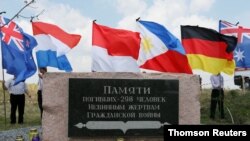Families of victims and their countries' embassies are marking the fifth anniversary of the downing of Malaysia Airlines flight MH17 over the conflict zone in eastern Ukraine, amid mounting evidence of Russia's involvement in shooting the passenger plane out of the sky.
The airliner flying between Amsterdam and Kuala Lumpur was shot down by a Buk missile on July 17, 2014, over territory in eastern Ukraine controlled by pro-Russian separatists, killing all 298 people on board, including 80 children.
In the Netherlands, which lost 193 citizens, commemorations began on July 16, when family members of 15 of the victims assembled in the town of Hilversum for a vigil.
It was led by a priest who grows sunflowers from seeds brought from eastern Ukraine where the plane was shot down.
A separate MH17 conference took place in the Netherlands on July 16, as well as a roundtable in Washington, D.C.
Speaking in Washington, George Kent, deputy assistant secretary of state at the Bureau of European and Eurasian Affairs, said that "Russia set the stage for the shoot-down of MH17 by financing, organizing, and leading proxies in eastern Ukraine."
He also said that "Russia continues to deny the presence of its forces and materiel" in non-government-controlled parts of Ukraine.
Moscow has repeatedly denied any involvement in the MH17 tragedy.
Nine embassies whose citizens perished on the flight plan to hold a memorial on July 17 in Malaysia, which lost 43 citizens.
Another memorial is taking place at Schiphol Airport in Amsterdam that is closed to the media.
Investigators from the Dutch-led Joint Investigative Team (JIT) have concluded that a Russian antiaircraft-missile brigade transported the sophisticated projectile system from and back to Russia into Ukraine.
The JIT in June furthermore indicted three Russians with military and intelligence backgrounds and a Ukrainian man with no prior military experience on murder charges.
The four suspects are scheduled to be tried starting in March 2020 in the Netherlands, although all are believed to be in Russia.
And investigators promised to continue investigating suspects, including those in the "chain of command."
Western states imposed sanctions on Russia after the incident, bolstering existing measures that were put into force after Russia annexed Ukraine’s Crimean Peninsula in March 2014.
Dutch prosecutors might get to question a possible key witness of the events after an elite Ukrainian unit on June 27 detained Volodymyr Tsemakh at his home in a separatist-held city in the Donetsk region.
Tsemakh oversaw an air-defense unit in a town near the crash site.
His lawyer and daughter told local media that Ukrainian authorities are charging him with terrorism that carries a maximum 15-year prison sentence.
Meanwhile, Tsemakh's wife sent a pro-Moscow separatist official a picture of her husband after he was arrested with a bandaged wound on his forehead, according to online open-source sleuth Bellingcat.
TV footage uncovered by Current Time, the Russian-language network led by RFE/RL in cooperation with VOA, showed Tsemakh claiming that he was in charge of an antiaircraft unit and that he helped hide the Buk missile in July 2014.
He furthermore shows the interviewer where the civilian airliner fell.
A July 15 RFE/RL report also outlined how Russian and Moscow-controlled media in nongovernment-controlled parts of eastern Ukraine first reported that separatists had downed a Ukrainian military plane during the time when MH17 was downed.




